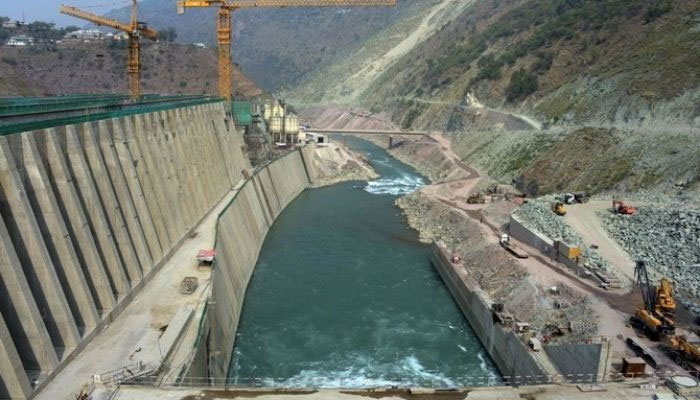India plans to connect rivers to stop water flow to Pakistan
India Today further mentions that Pakistan has written four letters to India, pleading with New Delhi to restore IWT
ISLAMABAD: In a new disclosure, the Modi government has made plans to connect the Indus River with the Ravi and Beas Rivers by diverting water to the Harike Barrage in Punjab through the Sutlej River, reports the India Today.
In its edition of June 8, the India Today says that India suspended the Indus Waters Treaty after the April 22 Pahalgam terror attack, and now the Indian government has devised a long-term strategy that will make Pakistan yearn for every single drop of water in the coming future. According to the report, Prime Minister Narendra Modi-led government is committed to making Pakistan pay for the Pahalgam massacre, and plans are in place to restrict water from the Indus, Sutlej and Beas Rivers to Pakistan. The Modi government has plans to connect the Indus River with the Ravi-Beas Rivers by diverting water to the Harike Barrage in Punjab through the Sutlej River. The mega canal will be around 200-km-long, and involves constructing as many as 12 large tunnels. Water running through these tunnels will flow into the Indira Gandhi Canal, and a few others including the Ganga Canal in Rajasthan, ultimately flowing into the Yamuna River.
The India Today further mentions that Pakistan has written four letters to India, pleading with New Delhi to restore the Indus Waters Treaty which was suspended after the Pahalgam terror attack in April. It says that once the project is completed, several Indian states including Jammu and Kashmir, Punjab, Himachal Pradesh, Rajasthan, Haryana and Uttar Pradesh will benefit from Indus waters, while the excess water will flow into Ganges and Yamuna Rivers.
The project is expected to be completed within two to three years and will also help in reviving the Yamuna River in many places, officials said. “The Chenab River will also be linked with the Beas River through Juspa Dam of which almost 40 work has already been completed,” says the Indian newspaper.
-
 Eric Dane's Girlfriend Janell Shirtcliff Pays Him Emotional Tribute After ALS Death
Eric Dane's Girlfriend Janell Shirtcliff Pays Him Emotional Tribute After ALS Death -
 King Charles Faces ‘stuff Of The Nightmares’ Over Jarring Issue
King Charles Faces ‘stuff Of The Nightmares’ Over Jarring Issue -
 Sarah Ferguson Has ‘no Remorse’ Over Jeffrey Epstein Friendship
Sarah Ferguson Has ‘no Remorse’ Over Jeffrey Epstein Friendship -
 A$AP Rocky Throws Rihanna Surprise Birthday Dinner On Turning 38
A$AP Rocky Throws Rihanna Surprise Birthday Dinner On Turning 38 -
 Andrew Jokes In Hold As BAFTA Welcomes Prince William
Andrew Jokes In Hold As BAFTA Welcomes Prince William -
 Sam Levinson Donates $27K To Eric Dane Family Fund After Actor’s Death
Sam Levinson Donates $27K To Eric Dane Family Fund After Actor’s Death -
 Savannah Guthrie Mother Case: Police Block Activist Mom Group Efforts To Search For Missing Nancy Over Permission Row
Savannah Guthrie Mother Case: Police Block Activist Mom Group Efforts To Search For Missing Nancy Over Permission Row -
 Dove Cameron Calls '56 Days' Casting 'Hollywood Fever Dream'
Dove Cameron Calls '56 Days' Casting 'Hollywood Fever Dream' -
 Prince William, Kate Middleton ‘carrying Weight’ Of Reputation In Epstein Scandal
Prince William, Kate Middleton ‘carrying Weight’ Of Reputation In Epstein Scandal -
 Timothée Chalamet Compares 'Dune: Part Three' With Iconic Films 'Interstellar', 'The Dark Knight' & 'Apocalypse Now'
Timothée Chalamet Compares 'Dune: Part Three' With Iconic Films 'Interstellar', 'The Dark Knight' & 'Apocalypse Now' -
 Little Mix Star Leigh-Anne Pinnock Talks About Protecting Her Children From Social Media
Little Mix Star Leigh-Anne Pinnock Talks About Protecting Her Children From Social Media -
 Ghislaine Maxwell Is ‘fall Guy’ For Jeffrey Epstein, Claims Brother
Ghislaine Maxwell Is ‘fall Guy’ For Jeffrey Epstein, Claims Brother -
 Timothee Chalamet Rejects Fame Linked To Kardashian Reality TV World While Dating Kylie Jenner
Timothee Chalamet Rejects Fame Linked To Kardashian Reality TV World While Dating Kylie Jenner -
 Sarah Chalke Recalls Backlash To 'Roseanne' Casting
Sarah Chalke Recalls Backlash To 'Roseanne' Casting -
 Pamela Anderson, David Hasselhoff's Return To Reimagined Version Of 'Baywatch' Confirmed By Star
Pamela Anderson, David Hasselhoff's Return To Reimagined Version Of 'Baywatch' Confirmed By Star -
 Willie Colón, Salsa Legend, Dies At 75
Willie Colón, Salsa Legend, Dies At 75




